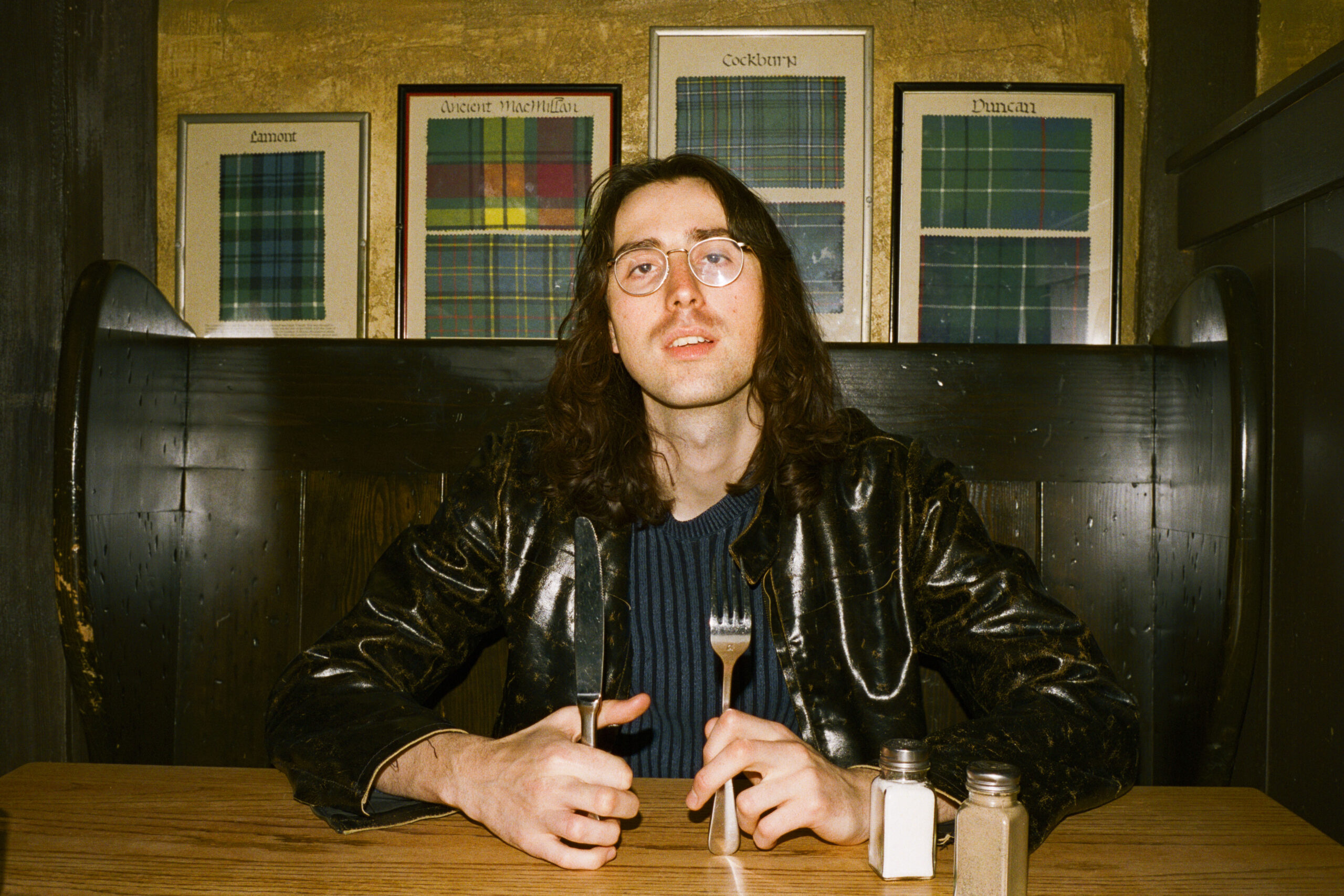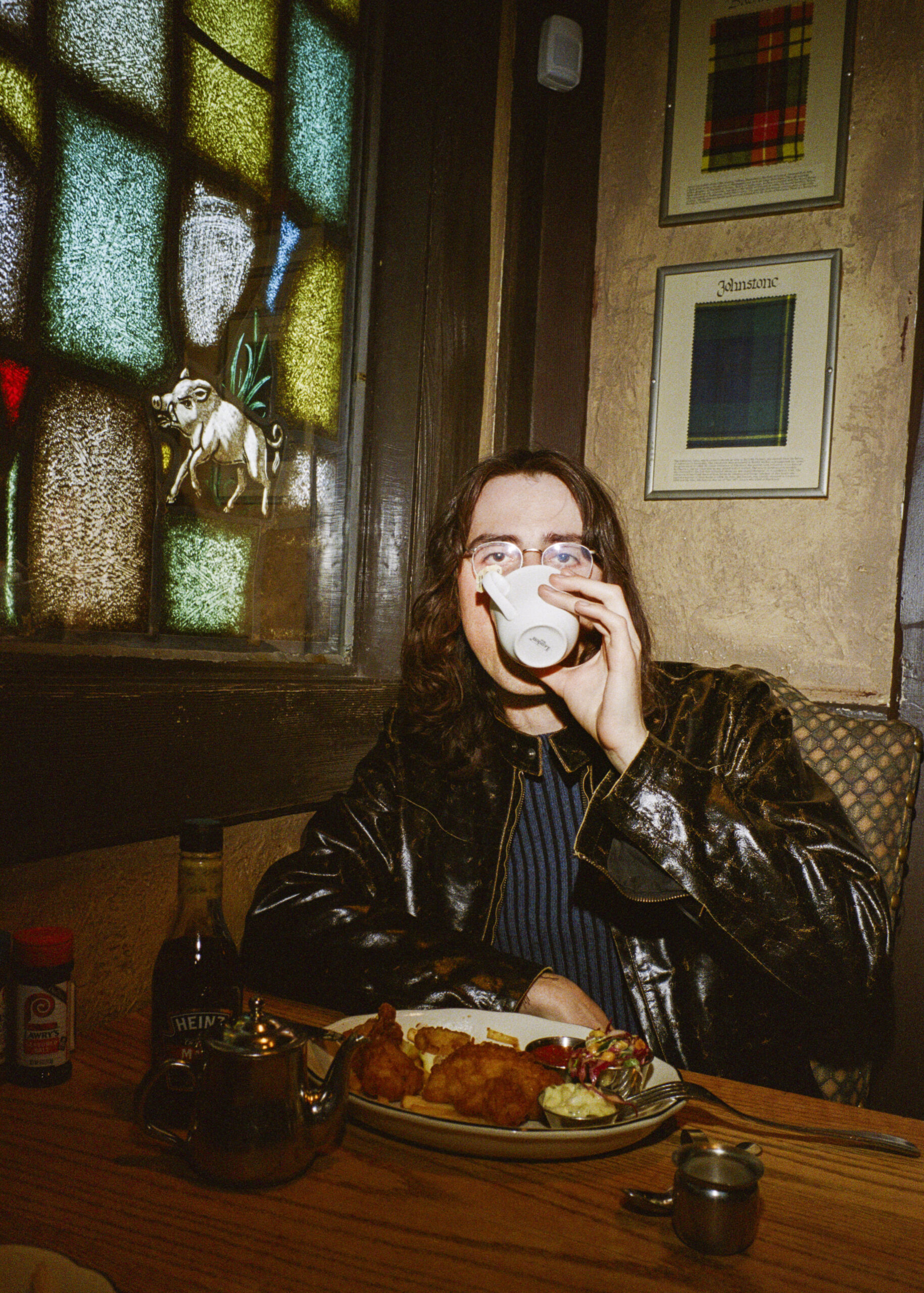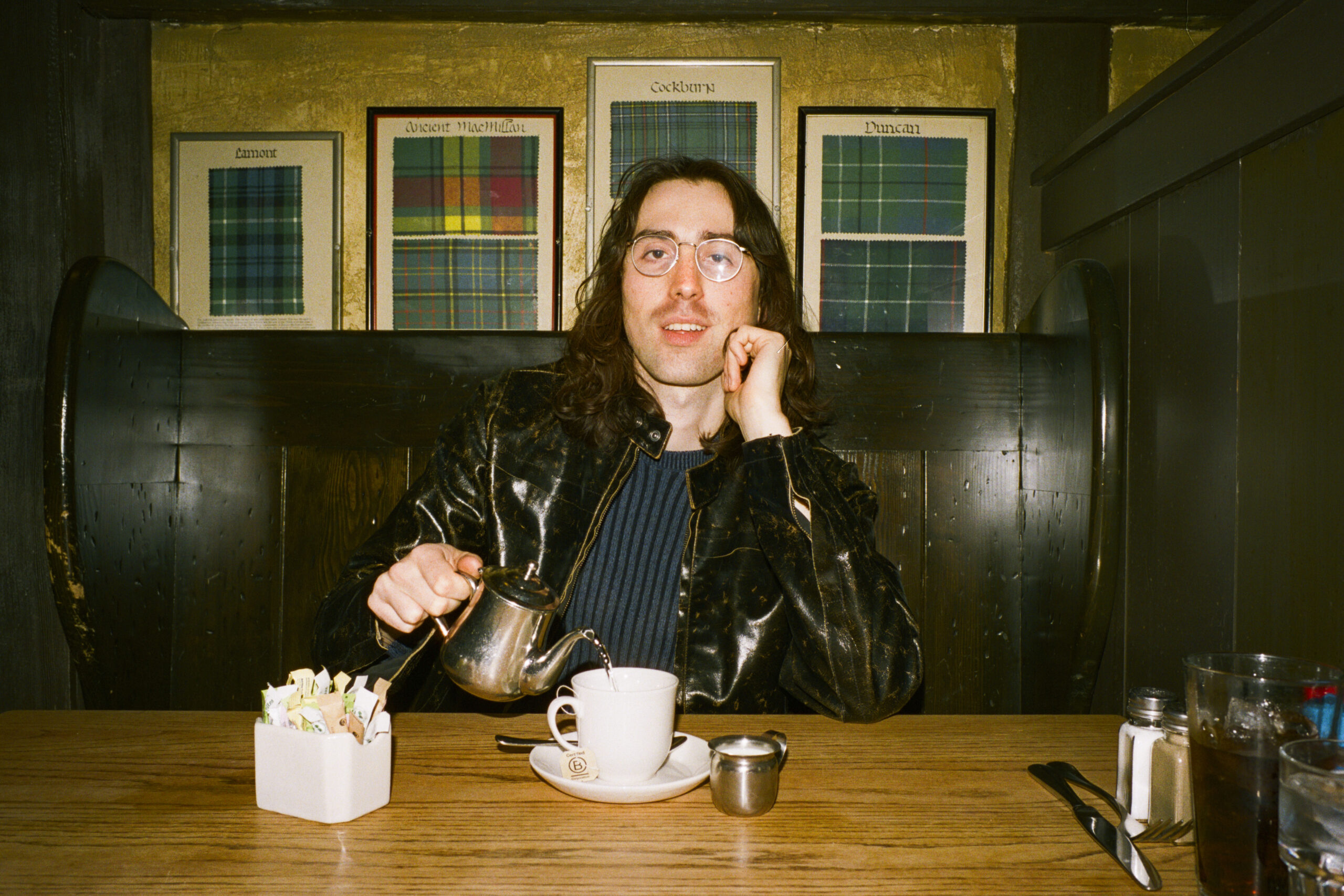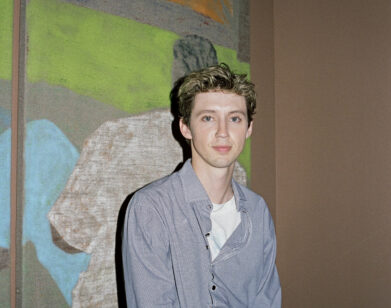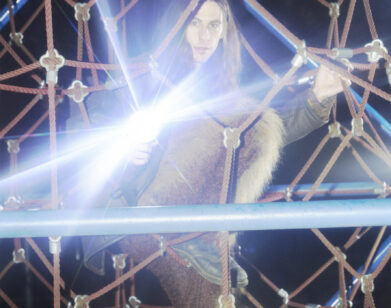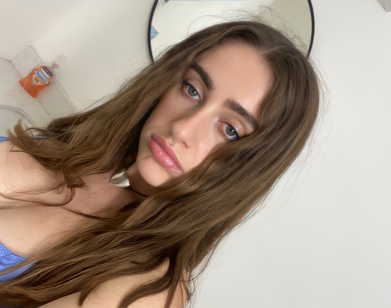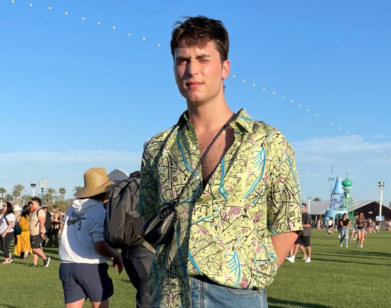WUB WUB
A. G. Cook on EDM Bros, British Snark, and Rihanna’s Comeback
A. G. Cook is dreaming of a world with no limitations. And for the artist and producer, who’s been on a roll of transitions and collaborations recently, it feels like there aren’t any. If you’ve ever noticed that the dividing line between experimental music and pop has dissolved, as multimedia artist Matt Copson did when he called him up, you might just have Cook to blame. After making it big for being the executive producer and creative brains behind much of Charli XCX’s music (including her latest, Brat), and over a decade of releases under his label, PC Music—featuring artists like Caroline Polachek, 654AR, and Rebecca Black—he’s definitively become the founding father of hyperpop. Cook wrapped up PC Music last year in favor of his new label, New Alias, under which he dropped the third studio album of his own last week, Britpop, an exploration of the Londoner’s own sonic context. Following a three-city roadshow, Cook and Copson, also a former PC Music artist, ran it back on Red Bull Music, surrealist cartoons, and rowdy SOPHIE shows.
———
MATT COPSON: This is the interview you’ve been waiting for your whole life. This is the really scary one. You know how tough and harsh I’m going to go.
A. G. COOK: I mean, you are quite harsh.
COPSON: [Laughs] How was New York?
COOK: On the Britpop Roadshow, we had done The Viper Room in L.A., which is a very particular old Hollywood, and then Underworld in London, which is Camden metal punk scenes from yore. The Trans-Pecos ones were really fun and really engaged, but also by far the most DIY. It was ending the roadshow in the most compressed way. It felt like we actually knew the stuff finally, and then literally the very final minute there was a power cut, which felt almost perfect. Walking off stage in basically total blackout. But New York has always been the core fan base for PC music. Every time you look at the stats it’s like, “New York, Brooklyn.”
COPSON: I always see that, but it doesn’t ring true to my experience of the city. It feels like a shell of itself and less culturally potent than London and L.A. right now.
COOK: I don’t know. We want it to be the mega-Manhattan Gotham City, and when it fails to be that, we’re like, “Oh, it’s empty.” But the amount of people who also are moving in and out to be part of that culture is immense. I’ve been intrigued, probably my entire life, with looking at the fault lines of these fake binaries, like electronic music versus acoustic, and challenging that. If I play a live show, it always has a bit of that tension. That’s why I don’t do too many live shows. I like them feeling quite risky. Awkwardness is a real core ingredient. We’re constantly living between these positions of real, unreal, slick, DIY. I’m not that interested in music that doesn’t have that tension, or in a culture that doesn’t have it.
COPSON: I agree. And we only ever understand the present moment in hindsight. Like, obviously if you go back to ancient Rome, it wouldn’t look like Rome as we know it with the ruins and everything. It might be too gaudy for our taste.
COOK: There would’ve been rug tapestries in every color, and that would’ve been the flex. I think that’s precisely why I’ve been doing this slightly contrived game of dividing the album into past, present, and future. Even in the very early PC days when it was being called “futuristic,” I really always thought it was about acknowledging the present and doubling down on an elephant in the room, the most obvious example being Red Bull. The neon fridge was always there in that entire decade of music. I mean, they’re still hanging around, even though they’re not investing. But I feel like most other people did these big club nights with Red Bull and tried to put the logo in as small as possible, versus PC was like, let’s bring a skyscraper-sized Red Bull can. I think that desire to engage with the present unlocks everything else.
COPSON: Music’s a good one for that because it’s almost inherently in the present.
COOK: Exactly. My tracks often have these self-conscious outros or intros that really milk the theater of the song transitioning. I feel like I got into music relatively late, compared to some friends who grew up knowing that music would be their universe. And I think that’s why I just can’t resist making a meal out of it. It’s really drawing the tension to it being a time-based roller coaster where hopefully anything could happen. Especially with music software now being so unlimited.
COPSON: It’s funny when I come around to your studio and I see the Logic as the song is playing, so I try not to look at it because it’s a spoiler alert.
COOK: Yeah, there’s 20 layers happening. [Laughs] With those audio workstations you have to set your own limits too. And limitations are really important, but I think that’s also something I enjoy playing with on some of my tracks. You think you know what the limitations are, and suddenly that dubstep synth or that string instrument will happen and suddenly it’s all about that for a second. It’s like, what if for a second there’s no limitation?
COPSON: Yeah, you love that kind of mic drop moment. There’s a lot of bwarrrrbs going on in the whole album.
COOK: Actually, my computer wasn’t working that well because of various updates, so there was a month or so where I was really wanting to make very cold, digital sounds, but they were just crashing my computer. It was comically bad. So I went out of my way to find some of those sounds in the analog space, which was quite laborious. I borrowed a bunch of modular synths from BloodPop and bought some of my own and I had them all in this metal-like lunchbox, basically. I even traveled with that lunchbox to Montana to be off the grid. That led to a lot of those wub wubs because it was me being like, “How digital can I make something that is actually not even plugged into a screen?” That was a big experiment for me.
COPSON: But it’s also really fun what it does to people’s bodies in a show because classically there’s a lot of buildup and it drops in a certain way where you can see the desire in people’s bodies to rage for a moment.
COOK: Yeah, and then that fades out.
COPSON: But the buildup is inherently more interesting than the destination. It’s like, it’s a really great goal to get there, but heaven’s never going to be that much fun, and the wind up to that glory moment is actually the joy of living.
COOK: Yeah. I’ve personally felt that a lot with music. Sometimes people think I’m just being a troll for tracks not dropping, but I’m not that big a fan of drops, really. I think they obviously have a purpose, but I prefer those moments of buildup, the beauty and chord progressions before they’re resolved.
COPSON: I remember one of the funniest shows I’ve ever seen you play, which was Porter Robinson—what’s his alter ego called?
COOK: Virtual Self. It was at that Shrine venue.
COPSON: You were doing this “Teenage Dream” remix, taking all of the classic pop mechanisms out of the song and reforming it around a lot of booing EDM bros. It was really exciting.
COOK: I know there was a strong front row who were into it, but it was so funny. They would be seriously booing when it didn’t drop, and then other people cheering, fighting them a little bit. The set was so extreme and filled with those moments, especially when I was playing my unreleased stuff, that I actually ended up just playing the “Teenage Dream” acapella. I wasn’t intending to even do it, I just played the acapella and manually played a kick drum underneath it for the entire three minutes really slowly. Not in a cool way, just in a giant stomping way. It was not exactly a fuck you, but a “let’s take this to its extreme now that there’s already some horrible conflict about it.”
COPSON: It reminded me of early PC days in London. I remember whenever I would DJ some of your early stuff or SOPHIE or something, people would get really angry about it because the paradigm that was going on then was the Young Turks or Night Slugs type of more tasteful approach to London music.
COOK: Which is so funny when you look back on it because it’s actually not different. It’s crazy that people would be really opinionated. I went to so many early SOPHIE shows where people were pretty angry and aggressive about it. But I felt like I was hearing the best club music I’d ever heard.
COPSON: I remember people getting angry at the ICA, which is ironic. It was formerly the center of radical gestures—J.G. Ballard’s Crashed Cars, but no, “LEMONADE” was too much.
COOK: Yeah, that’s where we draw the line.
COPSON: But I’m always really happy when I come across that culturally. People still getting upset over something means there’s still ground to be made. There’s still excitement. It seems like such a positive thing for people to get annoyed or proclaim the death of something.
COOK: Yeah, I’ve noticed a real change. I think our generation grew up with all these musical subcultures, which are probably already watered down from previous ones. So now everyone is, by nature, post-streaming, more eclectic. I’ve definitely noticed this with younger kids who are into music. You always don’t want to fully ride-or-die for a certain genre because that’s seen as a bit passé when you have access to so much stuff. It’s quite a major change in terms of how things are marketed or how labels work.
COPSON: I also think that the difference between what was deemed experimental and what was deemed pop seems to have entirely disappeared. Now it turns out the most pop thing you can do is release a 24-track album. It’s quite funny that you’ve ended up in the cultural zeitgeist of these extremely long albums. When 7G came out, which was even bigger obviously, it was presented in this choose-your-own-adventure way. Whereas with Britpop, I was really shocked by how cohesive it is, and I found myself actually going in for the long listen.
COOK: Yeah, I learned so much from doing Apple and 7G, it was unimaginable. During the pandemic, I had this weird resonance with limit and stamina, and going back to a really short classic album felt wrong. But I find some of the sprawling big albums that happened recently pretty hard to listen to, honestly. I feel like they’re not really playing any game other than streaming. That’s why I divide things into parts in dialogue. Without a little bit of a guide, the real challenge is making something long and meaningful. It almost forces you to transcend streaming and actually engage with it.
COPSON: Yeah, the album by nature is a narrative form, with a title, beginning, and ending. It makes sense that things have reverted to reasserting that form because clearly we’re desperately searching to give things context in the world we’re in right now.
COOK: I think that’s it. It’s a world where anything can be anything, and there’s so little context. And because it’s all stored digitally, Spotify could mess around with the UI and suddenly we’d all be swimming in music soup. That’s been the criticism of all their generated playlists with their amazing, crazy hallucinatory titles. I’ve seen some really funny ones. So as someone who’s like, “Why even bother making an album? Why drop more into the deluge?” That’s actually the resistance to make something crazy meaningful that would be ideally quite hard to imitate.
COPSON: Caroline [Polachek] and I were looking at these really well done AI images yesterday. I’d spent all day with Rick and Claire [Farin] from Actual Objects looking at the AI functions in Unreal 5. We were saying how, in the past, it was impossible to make an image with no context around it. Is it possible that we’re now creating art that genuinely has zero context to it without too much human input? In that case, the reassertion of narrative becomes the most important thing.
COOK: I project my own context onto things. I’m quite an aggressive listener and watcher.
COPSON: You are. Charli was telling me that she’d watched that film that we saw, The Apple. She was like, “It’s the worst film I’ve ever seen. I totally get why Alex is obsessed with it.”
COOK: It’s a Eurovision pastiche kind of dystopian film in Germany. There’s a big major label with a triangle logo that’s controlling everyone, but there’s also a lot of gratuitous everything in it. I watched some of Clifford, the Big Red Dog on the plane on mute and it goes between being very cute and very disturbing constantly. I’m not even really overthinking the intention of the movie, but it becomes a weird reflection of our culture that someone would make a film like that right now and it becomes a prison for all these other strange things going on.
COPSON: I mean, we were very obsessed with Cats when that came out. I do feel like that is just the most fascinating reflection of the world we live in.
COOK: That sequence where… is it Jason Derulo eating cockroaches?
COPSON: Yes.
COOK: The cockroaches are singing and then they’re being eaten, and then Jason Derulo takes you to the milk bar that’s overtly sexual. And then it just ends. The whole plot is like, we are going to introduce characters. I just think that’s genius, a movie that’s only ever about introducing characters, and then they review the fact that they’ve met a lot of characters, and then it ending on the word “ineffable.”
COPSON: It’s also amazing when you have the most famous pop star in the world singing a song about catnip for five minutes. It’s beautiful. Have you seen Lyle, Lyle, Crocodile?
COOK: Not fully. It’s on the list.
COPSON: I mean, we now live in L.A., which is another funny fictional environment to be in, and you see all these billboards everywhere for these films. Hollywood has simultaneously made the same story at the same time. I remember there was that film, No Strings Attached with Mila Kunis, and then there was another one exactly the same time.
COOK: Friends with Benefits, yeah.
COPSON: There’s two Bride of Frankenstein films coming out at exactly the same time. It’s funny when they start representing these deep psyche archetypes going on in the collective cultural imagination.
COOK: I think film does it so vividly, but music definitely has it. I’ve always wished for the comeback of Rihanna to be two albums at the same time, because why not? Don’t go for the middle ground. Just do the occasionally-rumored reggae album and the modern crazy pop one, side by side. I think what could be interesting is those things happening at the same time more and more, where you have to be both brands and there’s an acknowledgement that they’re two extremes.
COPSON: Yeah, it’s interesting. As you said that, I thought about the song, “Green Man,” because I’m very interested in the Green Man, which is this British folkloric character of rebirth.
COOK: Yeah. With Britpop, I was looking into bits of British history, and it’s such a small island that’s been worked over and over with all these layers. Supposedly the Green Man goes way, way back. He’s this pagan symbol with his face covered in leaves, but they’re still building churches where people can’t resist putting the Green Man into the stonework. So suddenly he becomes a sort of gargoyle-like church fixture as well. In that song, I wrote the main guitar melody almost immediately, and left bits of the original vocal on there quite loud because I felt that was Green Man-like. The ghost of the original voice demo is still there. I guess I’m loosely imagining him as something that’s hiding in a garden center or in a meadow. It’s fun for me to dip into this folklore specifically because in Britpop there’s this self-consciousness of being British. But I think the Green Man stands out as a really weird figure because it’s so truly pagan in the sense that it’s not heavenly or hellish, it’s just about rebirth. He hasn’t really been given up despite all the other figures that have come and gone.
COPSON: I thought about him in relation to Rihanna, and folkloric figures getting thrust into different spaces. The Green Man now existing in the garden center, or Rihanna now making a reggae album.
COOK: That could be a good name for her record, honestly. The light weed overtone.
COPSON: Reggae in the garden center vibes.
COOK: Yeah, I can see it.
COPSON: And another British thing is your use of purposeful cliche or idiom. The lyrics have a purposeful flatness to them.
COOK: I went out of my way to read funny things on British history and its poetry. And one song that really stuck out when I listened to it properly was 10cc’s “I’m Not In Love.” Everyone knows that song, but I really enjoyed the facetiousness of it. It feels a bit Monty Pythonesque as well. Then the subject matter [of the project] being more personal forced my hand in a way, but I always have the refuge of going back to completely instrumental tracks. You can be in a bit more of a dream state, and then you might come back with something really meaningful.
COPSON: I mean, I can’t think of anything more British, and quite specifically Britpop, than the combination of instrumental dance music and distorted, topsy-turvy language.
COOK: Yeah. And separating those into very specific courses.
COPSON: I think “Pink Mask,” was my favorite thing you’ve ever done. I thought of it like a pink mask, a face.
COOK: Yeah, it is basically a face in quite horrific way. That track is on the future [section] because I went so deep into this D&D-coded labyrinth of descriptions. A lot of credit goes to seeing how Alaska [Reid] has been writing her stuff over the years. Maybe it gave me more of a confidence to go into full imagery. Again, I wrote the lyrics and did that on some shit mic, and that just became the real version of it.
COPSON: It really reminded me of when we’ve played D&D and you’ve been Dungeon Master.
COOK: Exactly.
COPSON: I felt that there.


